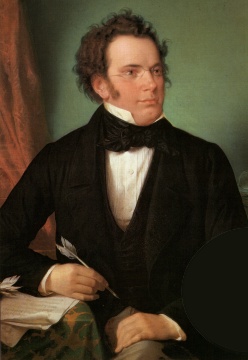
Schubert’s dark “Müllerin” gets complete performance Monday
Of the more than 1,000 pieces that Franz Schubert composed before his early death at the age of 31, around 600 of them are songs.
He was the supreme master of the German Lied in the first decades of the 19th century, and while there are many individual treasures in his vast catalog, he’s particularly admired for his song cycles. One of them, “Schwanengesang (Swansong),” was assembled after his death in 1828, but five years earlier he set out constructing one from the work of Wilhelm Müller, a popular poet of the day.
That cycle of 20 songs, Die schöne Müllerin (The Beautiful Maid of the Mill, D. 795), tells the story of a lovelorn miller’s apprentice who tries but fails to win the affection of his master’s daughter, and so drowns himself. Extravagant to be sure, but very much in keeping with the showy Romanticism of the time.
Although various songs from the cycle are heard frequently on art-song recital programs, it’s relatively rare to hear the whole thing at one go. On Monday evening, tenor Tony Boutté will perform the entire cycle in a concert at the Glasgow Lecture Hall in the University of Miami’s Department of Architecture. Pianist Geoffrey Loff will accompany Boutté, and musicologist Frank Cooper will read translations of the five poems from Müller’s original cycle that Schubert chose not to set.
In addition, Elizabeth Plater-Zyberk, one of the nation’s leading advocates of New Urbanism, will give the opening remarks before Boutté’s recital. A gathering of intellectual firepower, you might say, around an important work of Western music. But for Boutté, it’s also about a personal quest to present major song cycles in recital.
“I performed the cycle twice last month in Texas, and I did it two ways. The first time, I did 10 songs, then an intermission, then 10 songs, sort of like a regular lieder concert,” Boutté said. “And the second time I did it, I did it straight through, with little pauses, at the end of ‘chapters’ …. And I thought that was really effective, too.”
But Boutté said he was still aware there were other poems in the cycle, and he’d read a book on “Die schöne Müllerin” by Susan Youens, a musicologist at the University of Notre Dame. Consequently, he thought that presenting the work at UM, where he is an assistant professor of voice, would allow him to explore the work more thoroughly.
“If I’m going to present it on a university campus, I want to dig a little deeper,” he said.
In working closely with Loff, a graduate student, Boutté said he’s been able to try different interpretive ideas. And sometimes, the work reveals itself.
“It’s a very gradual process, to try to figure out not what Schubert meant, but what I think Schubert meant,” he said. “When you look at the score to see how it’s been done, you find places where you think, ‘Oh, he must have meant that to be connected.’”
He cites the 15th song in the cycle, “Eifersucht und Stolz (Jealousy and Pride),” in which the journeyman addresses the brook that runs through town, asking it to slow down and tell him what’s going on, and in which he also takes time to talk trash about the object of his desire.
“He says something like ‘Didn’t you see her standing at the gate, craning her neck when [a hunter she admires] came down the road? No decent girl should do that,’” he said.
Underneath this, the piano is punctuating with short chords, unlike the opening of the song, which starts with a series of rapid notes in the piano. After casting doubt on the girl’s character, the speaker then bids the brook to take that message to her and the opening music returns.
“And when we figured this out, of course it seems obvious now, but when you figure this out you get goose bumps,” Boutté said. “And I thought, ‘I’ve got to get the audience to feel this.’”
Doing the complete “Die schöne Müllerin” is perhaps less common today than it was a generation ago, when art-song recitals were a more frequent part of the classical lineup (there appear to be very few this season here in South Florida). Boutté says he loves the form and one of the reasons is that it gets the artist close to his auditors.
“It’s the intimacy. That’s the biggest thing: the intimacy of being one on one with the audience,” he said. “And that’s a scary thing for a singer. It’s almost easier to stand up in front of an orchestra and make lots of noise; you’ve got lots of people around you.
“But people crave that one-on-one connection … and as a singer, I crave that, too,” he said. “I want to be able to use my voice, and my interpretation, to get the message of the music out. And that’s the easiest way to do it.”
For his next cycle, Boutté said he’s likely to attempt “La bonne chanson (The Good Song, Op. 61),” written in 1892 by the French composer Gabriel Fauré. It’s a difficult but beautiful cycle, and like all Fauré, it is music of great subtlety.
As for Schubert, it’s worth noting that he wrote “Die schöne Müllerin” not long after learning he had contracted syphilis, and Boutté said there has long been musicological speculation that Schubert avoided the darkest poems of the cycle because it was too painful for him to confront, even through his art.
“It’s still pretty dark, but with some gorgeous music,” he said. “The beauty of the music, coupled with the poignant words — it’s pretty amazing.”
The concert is set for 7:30 p.m. Monday at Glasgow Hall. Admission is free.
Recent Content
-
Artsarticle ·
-
Artsarticle ·
-
Artsarticle ·

